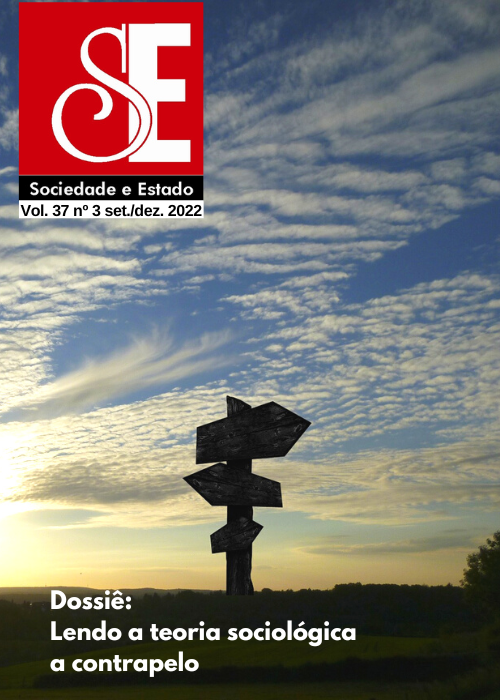A larger grain of sense. Making early non-Western sociological thought visible
DOI:
https://doi.org/10.1590/s0102-6992-202237030005Palabras clave:
theory, sociology, invisibilization, epistemology, disciplinary historyResumen
There are different ways to read sociological theory “against the grain”, as Walter Benjamin put it in 1940. The issue of invisibility – or invisibilization – is certainly the most important one. The mainstream and canonical narrative of the history of sociology and of sociological ideas and theories hardly leaves any room to non-Western appropriations and indigenizations from the late 19th century onwards. The article wants to offer another disciplinary history and another chronology by relying on instances from the late 19th century and early 20th century especially in Latin America and Asia (Japan and China). The circulation of different authors, books and theories, as well as their different reception according to the different countries and their different intellectual, social and political environments makes it possible to design a new chronology of sociological theory and of the institutionalization of the discipline. Despite the epistemic hegemony that was already established in the second half of the 19th century with the diffusion of sociological thought from France and Great-Britain (with Comte and Spencer), this circulation was no mere transplantation but rather a complex and selective appropriation that makes it possible for very different visions of the meaning of “sociology” as a movement of thought and also as an academic discipline.
Descargas
Citas
ALATAS, Syed Farid. Deparochialising the canon: the case of sociological theory.
Journal of Historical Sociology, v. 34, n. 1, p. 13-27, 2021.
______. Alternative discourses in Asian social science: responses to eurocentrism.
New Delhi: Sage, 2006.
______. The theme of “relevance” in Third World human sciences. Singapore Journal of Tropical Geography, v. 16, n. 2, p. 123-140, 1995.
______. The captive mind and creative development. International Social Science
Journal, v. 26, n. 4, p. 691-700, 1974.
______. The captive mind in development studies. Some neglected problems and
the need for an autonomous social science tradition in Asia. International Social
Science Journal, v. 24, n. 1, p. 9-25, 1972.
ALATAS, Syed Farid; SINHA, Vineeta. Sociological theory beyond the canon. London:
Palgrave-Macmillan, 2017.
ALEXANDER, Jeffrey. The centrality of the classics. In: GIDDENS, Anthony; TURNER,
Jonathan H. (Eds.). Social theory today, p. 11-57. Stanford, CA: Stanford University
Press, 1987.
ALTMANN, Philipp. Sociology in Ecuador. London: Palgrave-Macmillan, 2022.
ARON, Raymond. Main currents in sociological thought. New York: Basic Books,
-1967.
AU, Anson. Abandon canon in American sociology. International Journal of Sociology and Social Policy, v. 39, n. 5-6, p. 494-504, 2019.
BAEHR, Peter. Founders, classics, canons. Modern disputes over the origins and
appraisal of sociology’s heritage. New Brunswick, CA: Transaction Publishers, 2002.
BARNES, Harry E. (Ed.). An introduction to the history of sociology. Chicago, IL: The
University of Chicago Press, 1917.
BARNES, Harry E.; BECKER, Howard. Social thought from lore to science. 2 v. Boston,
MA: Heath, 1938.
BENJAMIN, Walter. On the concept of history (1940). In: EILAND, Howard; JENNINGS, Michael W. (Eds.). Walter Benjamin. Selected writings, p. 389-400. Cambridge, MA: Harvard University Press, 2003.
BEN JELLOUN, Tahar. Décolonisation de la sociologie au Maghreb. Le Monde diplomatique, n. 245, p. 18, 1974.
BERNARD, Luther Lee. La sociología sistemática de Mariano H. Cornejo. Revista
Mexicana de Sociología, v. 4, n. 2, p. 7-34, 1942.
BERNARD, Luther Lee. The historic pattern of sociology in the south. Social Forces,
v. 16, n. 1, p. 1-12, 1937.
BERNARD, Luther Lee. The development and present tendencies of sociology in
Argentina. Social Forces, v. 6, n. 1, p. 13-27, 1927.
BHAMBRA, Gurminder K.; GEBRIAL, Dalia; NISANCIOGLU, Kerem (Eds.). Decolonising the University. London: Pluto Press, 2018.
______. Connected sociologies. London: Bloomsbury, 2014.
BLANCO, Alejandro. La asociación latinoamericana de sociología: una historia de
sus primeros congresos. Sociologias, v. 7, n. 14, p. 22-49, 2005.
BLASI, Anthony J. Sociology in American higher education. In: BLASI, Anthony J.
(Ed.). Diverse histories of American sociology, p. 317-322. Leiden, NE: Brill, 2005.
BOATCA, Manuela; COSTA, Sérgio; GUTIÉRREZ-RODRÍGUEZ, Encarnación (Eds.). Decolonizing European sociology: trans-disciplinary approaches. Aldershot, UK: Ashgate, 2010.
BOTTOMORE, Tom; NISBET, Robert (Eds.). A history of sociological analysis. New
York: Basic Books, 1978.
BOURDIEU, Pierre. Leçon sur la leçon. Paris: Les Éditions de Minuit, 1982.
BOUTHOUL, Gaston. Histoire de la sociologie. Paris: Presses Universitaires de
France, 1950.
BURAWOY, Michael. Why is classical theory classical? Theorizing the canon and
canonizing Du Bois. Journal of Classical Sociology, 2021. Available at: <http://burawoy.berkeley.edu/Canon/Classical%20Sociology.Connell.pdf>.
BURAWOY, Michael; CHANG, Mau-kuei; HSIEH, Michelle Fei-yu (Eds). Facing an unequal world: challenges for a global sociology. 3 v. Taipei: Academia Sinica, 2010.
BURKS, Ardath W. (Ed.). Overseas students, foreign employees, and Meiji Japan.
New York: Routledge, 1985.
Descargas
Publicado
Cómo citar
Número
Sección
Licencia
Derechos de autor 2022 Sociedade e Estado

Esta obra está bajo una licencia internacional Creative Commons Atribución-NoComercial 4.0.











